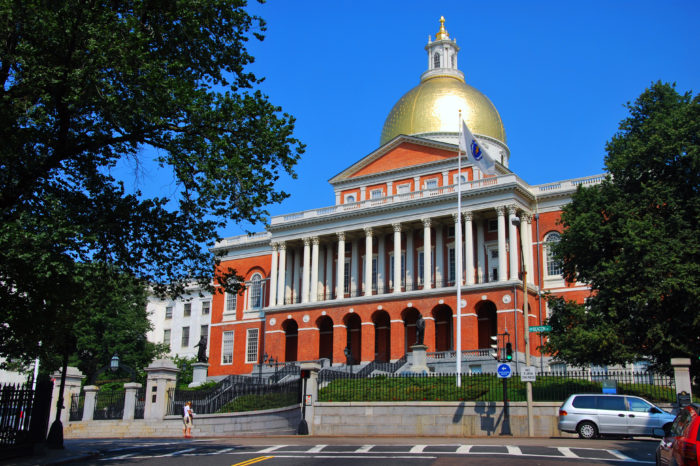Taxachusetts Must Be Stopped
This op-ed appeared in National Review on October 27, 2022 6:30 AM
The Bay State’s economic future is on the ballot.
During the 1980s Massachusetts earned the nickname “Taxachusetts.” In recent decades, however, state leaders worked together to get out from under that moniker. They cut the income tax from 6.25 percent to 5 percent, and Massachusetts fell from the fifth highest in the nation to twelfth in terms of the overall state and local tax burden.
Such reforms helped the Bay State become the innovation-driven economic powerhouse it is today. For example, thanks to a burgeoning biotech industry supported by top universities, the Moderna and Johnson & Johnson Covid vaccines were both developed in Boston. There is also a thriving start-up economy; a recent study conducted by WalletHub ranked Massachusetts the most innovative state in the country.
Moreover, the tax reforms helped the state rack up a budget surplus of nearly $5 billion for the last fiscal year. And this year, the “rainy day” fund is expected to climb above $6.5 billion, not to mention the billions in federal Covid relief and infrastructure funding that have yet to be distributed.
And yet, many state leaders seem determined to return to the bad old days. Indeed, this November, Massachusetts voters will decide on a constitutional amendment, the campaign for which is largely funded by the state’s two teachers’ unions, that would add a 4 percent surcharge to all annual incomes over $1 million, with the proceeds going to fund education and transportation.
But in 2018 arguments before Massachusetts’s Supreme Judicial Court, supporters and opponents of the proposed amendment agreed that it wouldn’t necessarily cause overall education and transportation funding to rise. In fact, while receipts from this tax have to be spent in those areas, it would be quite simple for lawmakers to offset any potential increase in funding for infrastructure or schooling by diverting appropriations currently flowing to education and transportation.
If you think that’s just a hypothetical, consider that last year state legislators twice rejected amendments — each by a nearly four-to-one margin — that would have required the new funding to be in addition to existing education and transportation appropriations. In other words, advocates are pushing for the biggest tax hike in state history — one that would generate $1.3 billion annually, according to a Tufts University study — at a time when Bay State legislators literally have more money than they know how to spend.
In addition to the new tax’s being unwarranted and misguided, Massachusetts voters have more simple reasons to oppose the amendment — almost 3 billion to be precise. In the final days of the state legislative session in late July, Governor Charlie Baker dropped a bombshell on the back-to-Taxachusetts crowd when he announced that overflowing coffers meant that an obscure 1986 law would be triggered for the first time in 35 years. The law — which itself passed via referendum — limits annual state tax revenue growth to the rate of growth in wages and salaries, thus entitling today’s Bay Staters to nearly $3 billion in tax credits.
What’s more, Massachusetts residents don’t have to look far to see the impact of “soak the rich” policies. Back in the Taxachusetts days, neighboring Connecticut was a (comparatively) low-tax state, ranking 17th in overall state and local tax burden. But after two decades of hiking taxes on high-earning individuals and employers, it now ranks second.
The fallout has been both economically disastrous and fiscally devastating. From 2008 to 2020, Connecticut ranked 49th in both wage and job growth. And after raising the top income-tax rate again in 2015, the amount paid by the state’s 100 largest taxpayers fell 45 percent the following year. As it turns out, it’s awfully easy to move assets or change your primary residence, especially for the affluent. Not surprisingly, then, Connecticut lost more high-income taxpayers per capita than any other state between 2012 and 2018.
At the end of the day, taxes impact individual and employer location decisions. Massachusetts sees a net gain in residents from high-tax states such as New York, New Jersey, and Connecticut. Yet despite the progress made in recent decades, those gains are a fraction of the net losses to low-tax states, and the pace of outmigration has quickened. Between 2010 and 2020, the Bay State experienced a six-fold increase in lost wealth, 71 percent of it to low-tax Florida and New Hampshire, according to recently released IRS data.
In the post-pandemic world of remote work, many people can live anywhere and still take advantage of vibrant job markets such as Greater Boston’s. Recognizing this, 13 states are pursuing tax cuts, and ten more have already cut their taxes. Count New Hampshire among the latter category; it recently moved to phase out its interest and dividends tax by 2027.
All this to say, going back to the bad old days of Taxachusetts would be an almost unfathomable mistake. Between the $3 billion bombshell that upended the recent legislative session, the ambiguity about how the tax revenue will actually be spent, and the contrasting examples of neighboring New Hampshire and Connecticut, Bay State voters have plenty of reasons to come back to reality and reject the ill-conceived proposal to amend the Massachusetts constitution this November.
CHARLES CHIEPPO is a senior fellow at Pioneer Institute, a Massachusetts public-policy think tank.



